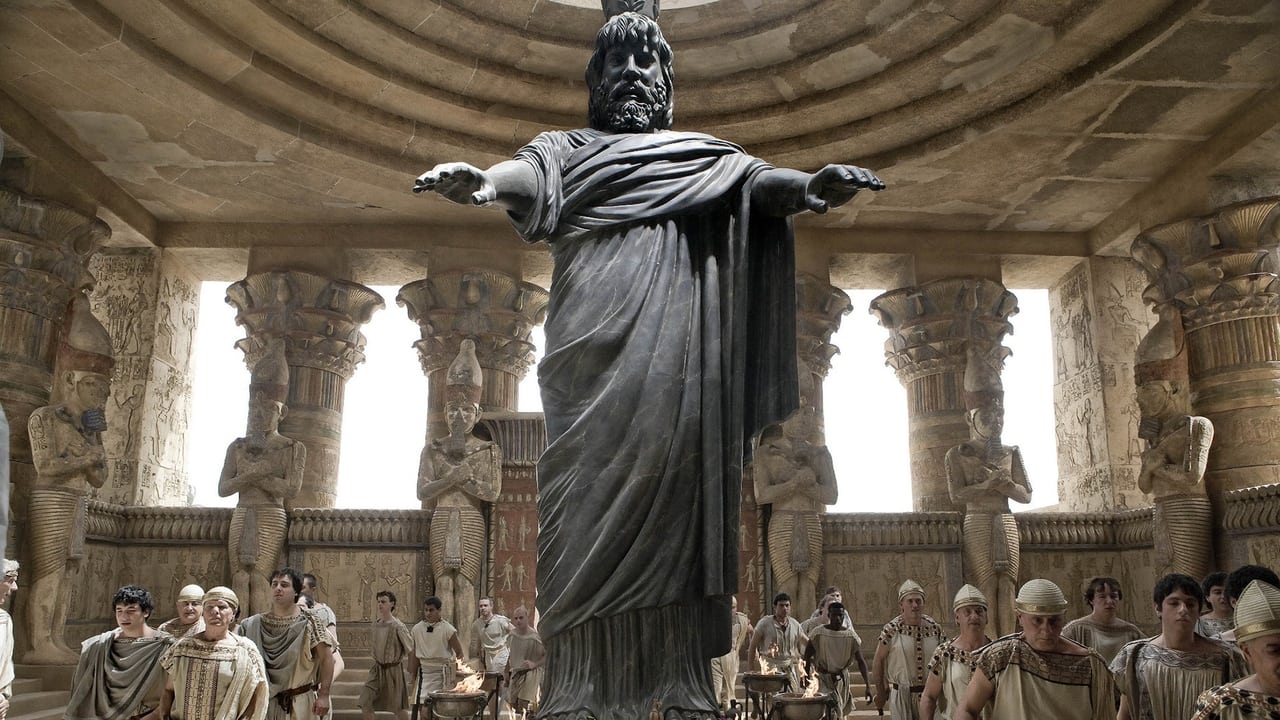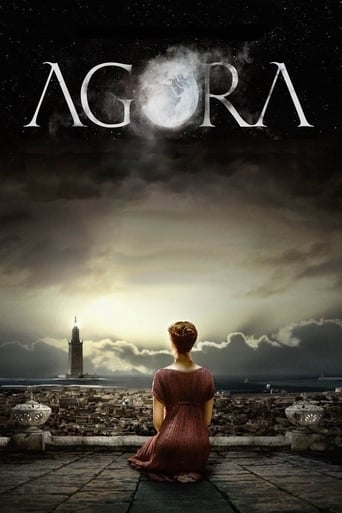

What a beautiful movie!
... View MoreMost undeservingly overhyped movie of all time??
... View MoreThere is definitely an excellent idea hidden in the background of the film. Unfortunately, it's difficult to find it.
... View MoreThe joyful confection is coated in a sparkly gloss, bright enough to gleam from the darkest, most cynical corners.
... View MoreStretched in Time, boring, a bit pathetic; The good side is that it gives okay picture of religious conflicts in Roman Egypt.
... View MoreRecounting the events that led to the destruction of the Great Library of Alexandria, this epic Spanish drama tells of the Christian-Pagan tensions in 4th century Roman Egypt, specifically focusing in on the slave of female philosopher & scholar Hypatia (Rachel Weisz), and how he witnesses her struggles to preserve the ancient knowledge against the rising Christian extremism.Ambitious but ultimately out of steam before the end, 'Agora' is rather lavishly mounted, but its hefty script doesn't quite pack the punch it ought to. It makes the classic mistake of a lot of historical/biographical films; it tries to cover so much ground and squeeze in as many historical events and personages as possible, and so whose story this is, and what even the main themes are, becomes really muddled. You have Hypatia's own experiments concerning astronomy, her own battles for preservation, the social tensions in Egypt, the religious tensions, Hypatia's slave and his quest for knowledge, the battle over the Library, the declining power of Rome, the rise of Christianity, it's just too much to cover in a little over two hours. Cutting out a lot of the side characters, most of whom are one note 'PRAISE DAH LOWD' archetypes, and centre the story more around Hypatia and her slave's quest, and the film would've been the better for it.A pity it's so scattershot and rambly, as there are quite a few good things, and it is a very superb production for European cinema. The sets and locations that recreate Roman Egypt look amazing and you really see and feel their size and just how populated they are, as well as the historical crossroads Alexandria is at. The cast is well rounded, with Weisz in top form as both a charismatic yet passionate and fiery Hypatia, joined by the likes of Oscar Issac, Max Minghella, Sami Samir, Michael Lonsdale and Rupert Evans, who all do fine jobs, even if their material is again, more limited. We even have a score from Italy's new cinematic go-to Dario Marrinelli, which takes a strongly religious/choral cue and is often sombre, reflecting the state of affairs in the story. Think of the more downbeat, intimate tracks of say 'Gladiator', as an entire film score.But it's a bloated script that lets all of this down. I cannot deny I respect director/co-writer Alejandro Amenabar for really pushing larger scale Euro film making, but he just forget to really have a powerful tale to bring it all together. Well mounted, but never truly enthralling. Shame really.
... View MoreMay contain spoilersThe film Agora is a dramatization of a historical event, the destruction of the Serepaeum, the "library of Alexandria." Read that again: a dramatization of a historical event.It is no understatement to say that the loss of the knowledge in this greatest library and center of learning in the ancient world had catastrophic consequences. That this film has generated a lot of controversy is not surprising. Much of the negative press is based on some factual errors in the film. It seems to be conveniently forgotten that this is a drama, not a historical documentary. Agora actually deserves credit for how much it gets right. It convincingly recreates the era and the city of Alexandria during a turbulent time when several factions vied for power in the city, pagans, Jews and Christians. Although it may appear that the Christians come off looking the worst of the bunch, there are no angels here. One of the pagan leaders incites a massacre of Christians which backfires when they discover there are far more Christians in the city than them. The Jews lure some Christians into an ambush under the pretense of a fire which the well meaning Christians respond to with water buckets. And the Christians defile holy places of both rival groups. The film makes it quite clear however, that the Christian zealot Cyril (Samir) is driven more by desire for power than by faith and is merely using his followers for political ends. The movie is less an "attack" on Christianity than a warning about the dangers of fundamentalism of any stripe (even, dare I say, atheism), and of blindly following charismatic leaders.The central character is the famous pagan mathematician and astronomer Hypatia (Weisz). A story of a love triangle between her and the noble born Orestes (Isaac), a student of hers, and her personal slave Davus (Minghella) has been added more as a device to tell the larger story than as the main plot of the film. Hypatia has dedicated herself to philosophy, and has no care for the earthly pleasures of this world. The film suggests that she was virginal; that she was widely regarded as a symbol of virtue is chronicled in several contemporary written accounts. Although a love triangle, it is unrequited love on both sides. This is the vehicle used to bring us into this time and place, but the real story is the conflict between superstition and fear versus knowledge and open inquiry. In Hypatia's time, mathematics was essentially geometry, and we see this regularly as she uses geometrical methods to solve problems. The film expects at least some familiarity with the science and mathematics that is discussed in it, as we see Hypatia struggle to find a way to reconcile observations of the heavenly bodies (the "wanderers") with competing theories, the Ptolemaic system and a heliocentric system. Touches like these added to my enjoyment of the film. The CGI is excellent and rarely intrudes, and brings this ancient city to life. Weisz does a fine job portraying Hypatia, dedicated to her philosophy and pursuit of knowledge for its own sake. She certainly looks the part with her features, her dark curly hair, and proud bearing. The film's convincing recreation of the time and place is a large part of the appeal this film had for me, but the drama and action are also good and the visuals are often well above average. It is an enjoyable and thought provoking movie if one goes into it with an open mind. It almost begs you to ask yourself: how might history have been different if this knowledge had not been lost.
... View MoreI did not believe that i did not review this title before. What an extraordinary film! It goes right to the bottom of everything. With a fight of religion during all of our lifetimes, this is a film to watch for all who understand what is happening in the world today.Plot is fantastic, acting is fantastic, cinematography is fantastic, everything about this film is fantastic! I watched this film several times, which is a rare occurrence for me, since I very rarely watch films more then one time.I strongly recommend that anyone who wants to discuss religion or have an opinion about it watch this film, and not only them. It is a film which atheists and believers should see. Eyeryone should see this film! What a great film! Please make an effort to see it and try to understand it.
... View More